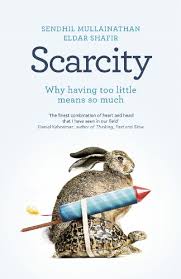
Stress is a mental event caused by a perception of lack; not enough money, time, health or love. ‘Whatever’, as they say. It’s all stress.
New research by Princeton University’s Eldar Shafir looks at how the brainpower required to cope with urgent financial needs impedes one’s ability to think clearly, and causes us (including freelance writers like yours truly) to make poor decisions. Shafir discovered an IQ drop of 13 points in just minutes when people with low incomes were faced with money stressors in an experimental situation.
Shafir has written a book on scarcity research with Harvard economist Sendhil Mullainathan. Scarcity: Why Having Too Little Means So Much explains their work in a broader context.

Becoming consumed with a problem causes a narrow focusing of attention. Says Shafir: “In the book, we describe a starvation experiment performed at the University of Minnesota in which male volunteers were placed on a progressively calorie-reduced diet until they had just enough food to avoid permanent harm. Over time, their mental states changed. They didn’t just think more about food, they were unable to think about anything else.”
It makes sense that if you’re nearly starving you’ll most likely be preoccupied with food. It’s also true that my scarcity may be your abundance. A perception of scarcity can arise from a mind that is never at rest, from fixations that are mental habit patterns based on conditioning: if our parents were always stressed about money because of their upbringing, might we assume an attitude of scarcity even though we’ve never actually experienced it? Would Bill Gates feel a sense of scarcity if he lost half his fortune?
Further, it’s essential to note that we can train our brains/minds away from a narrow focus on scarcity and toward a more expansive experience of rest. Brain/mind training through the practice of mindfulness meditation, over time and with practice, will broaden one’s focus and help to release old mental habits that no longer serve us well. Regardless of whether the perception of scarcity is a fact or a mind-fiction, the effect on the brain is the same. On this website are several suggestions to help with stress reduction, including neurofeedback, Open Focus training and mindfulness meditation.
The ultimate freedom is happiness regardless of conditions. I’m not totally there yet, which is why I would love you to purchase my book: Better Brain Better Life: Tips and Tales from the Tantalizing World of Brain Science. Although my book is not expensive, the purchase of it may temporarily exacerbate your perception of financial stress. However, the tips within the book just might open your mind to a new way of looking at these issues in your life! How’s that for a sales pitch?
I’d love to know about your experience. Does stress shut your brain down too? If so, what helps?
